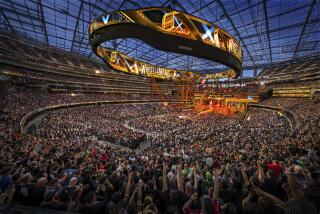KKR-Spalding Team May Signal Wider Changes
- Share via
The $15-billion U.S. sports equipment industry is about to become a whole new ball game, courtesy of deal maker Kohlberg Kravis Roberts & Co.
KKR, in announcing plans this week to buy control of Spalding & Evenflo Cos., said it might use the purchase as a springboard to buy even more competitors in the field.
That could usher in a major consolidation of the sports equipment business, whose players today tend to rely on only one or two sports for the bulk of their sales, analysts said Friday.
“There is a huge opportunity in the sporting goods industry for someone to go across sports . . . to build a conglomerate of strong branded sporting goods products,” said Shelly Hale Young, an analyst at the investment firm Hambrecht & Quist in San Francisco.
KKR, the giant buyout specialist in New York, wouldn’t comment specifically on its long-range plans for Spalding & Evenflo. But it said the company has “outstanding potential” for growth “both internally and through acquisitions.”
KKR said Thursday that it plans to buy control of Spalding & Evenflo from Venezuela’s Cisneros Group of Cos. The price and other details were not disclosed.
Spalding & Evenflo, based in Chicopee, Mass., makes Spalding balls for team sports and Top-Flite golf balls, and it claims to be the world’s biggest seller of golf balls, basketballs and softballs. It also has interests in sports footwear and apparel.
The Evenflo part of its business makes children’s products such as baby bottles and car seats.
Excluding footwear and apparel makers such as Nike Inc., Spalding & Evenflo is the nation’s biggest sporting goods supplier, with sales last year of $794 million, according to the trade magazine Sportstyle.
Other big players in mass-merchandised sports gear are Wilson Sporting Goods ($440 million in estimated sales), which is owned by Amer Group Ltd. of Finland, and Rawlings Sporting Goods Co. ($144 million in estimated sales), which is publicly held.
Paul Martin, chief financial officer at Fenton, Mo.-based Rawlings, said it’s “a reasonable conclusion” that KKR might try to add more companies to its sports stable. But he added that “our company is not for sale.”
Even if KKR stays with only Spalding & Evenflo, analysts said KKR will have a chance to exploit valuable assets--Spalding’s familiar brand names.
“Spalding has very popular brands, particularly in the golf area, that give it value,” said Frank Latuda, analyst at the regional brokerage firm Burns Pauli Mahoney Co. in St. Louis.
KKR’s involvement will “have a definite impact in terms of raising the level of competition,” said Thomas Doyle, research director at the National Sporting Goods Assn., a trade group.
That’s important, because the industry’s growth is typically lackluster, meaning competitors must grab market share from one another to grow. NSGA figures show that in dollar terms, the industry has grown by an average of 5% annually for the past decade--barely outpacing inflation.
KKR’s track record also raises the prospect that Spalding & Evenflo will eventually be spun off into a public company or resold. That’s often how KKR cashes out its initial investment. Indeed, earlier this week, Munich Reinsurance Co. agreed to pay $3.3 billion for American Re Corp., which is 64% owned by KKR. KKR’s expected profit on the sale: $1.7 billion.
More to Read
Inside the business of entertainment
The Wide Shot brings you news, analysis and insights on everything from streaming wars to production — and what it all means for the future.
You may occasionally receive promotional content from the Los Angeles Times.











